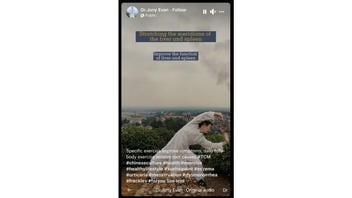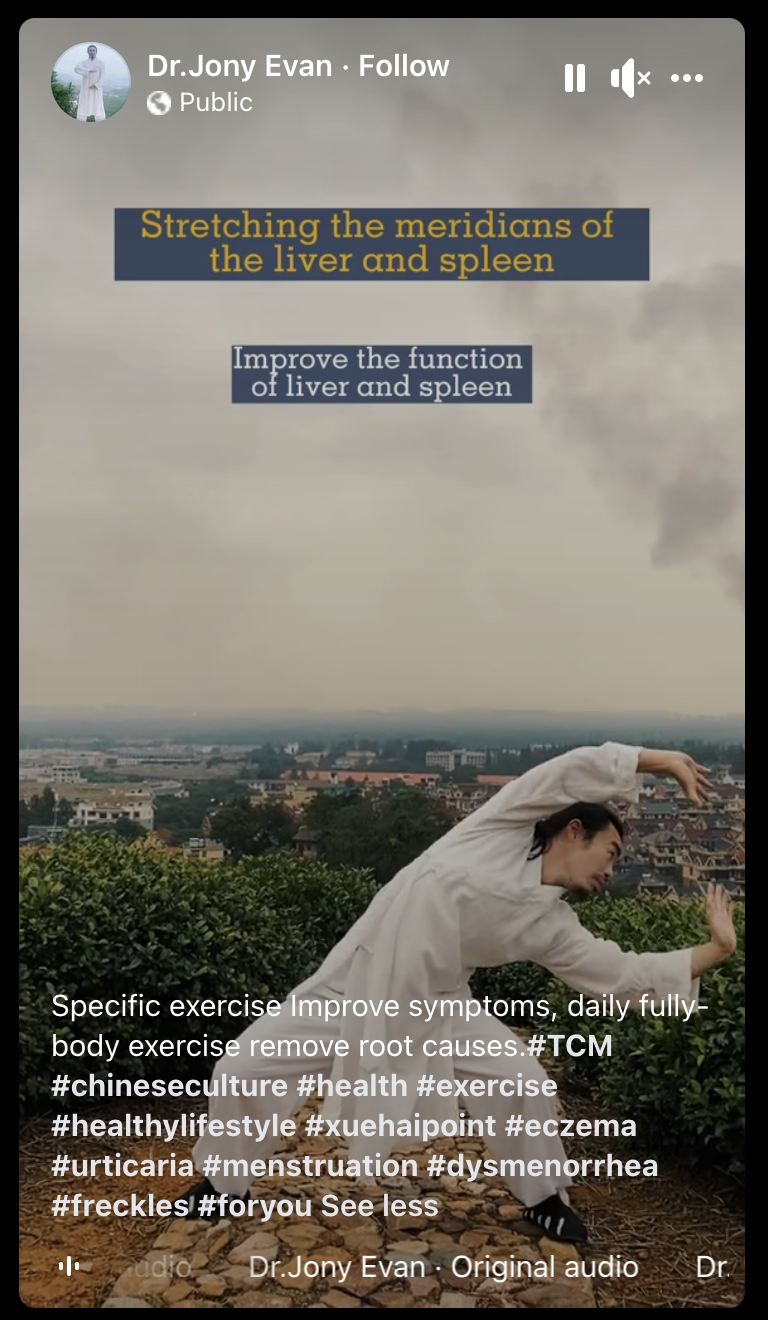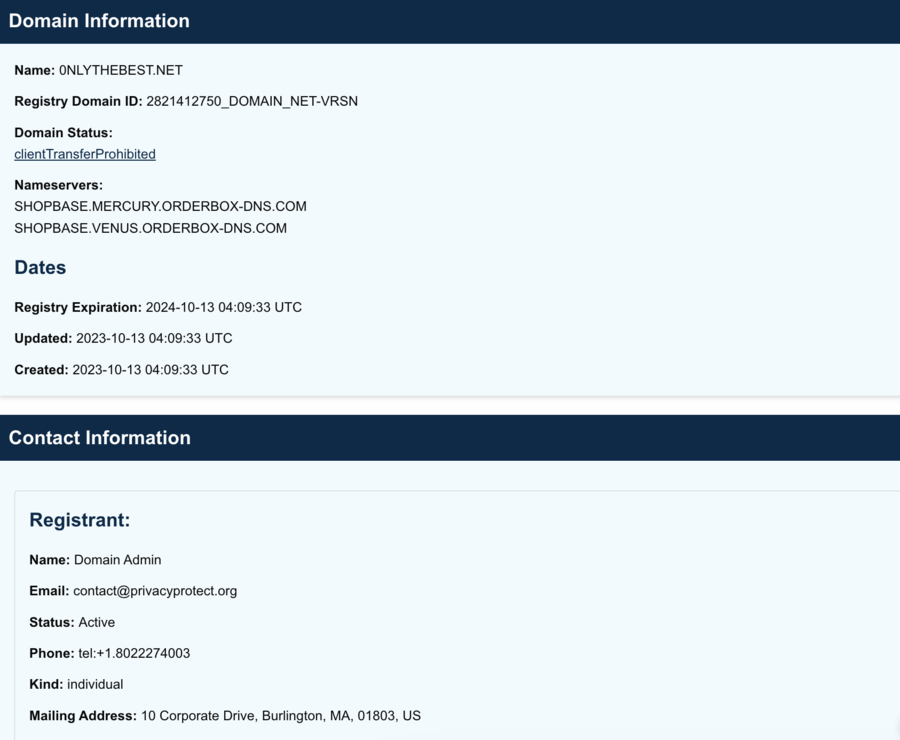
Does stretching the back and arms improve liver and spleen function by stimulating certain "meridians," as a post on Facebook suggested? No, that's not true: A gastroenterologist told Lead Stories that "there is no conclusive scientific evidence that meridians exist" and "no evidence that [stretching] can be used to improve liver and spleen function." The page that posted the claim in question is not affiliated with a legitimate medical professional -- it is listed as an "Entertainment website" on Facebook. Furthermore, a link on the Facebook page sent users to a website that sold various household products.
The claim originated in a video shared to Facebook on March 20, 2024 (archive), with a text overlay that stated, "Stretching the meridians of the liver and spleen Improve the function of the liver and spleen." A caption that accompanied the post read:
Specific exercise Improve symptoms, daily fully- body exercise remove root causes.#TCM #chineseculture #health #exercise #healthylifestyle#xuehaipoint #eczema #urticaria #menstruation #dysmenorrhea #freckles #foryou
Below is how the post appeared at the time of writing:
(Source: Facebook screengrab taken Fri March 22 11:50:59 UTC 2024)
Dr. Neeral Shah (archive), a gastroenterologist at the University of Virginia, responded to Lead Stories regarding the claim, saying in an email received on March 26, 2024, that "there is no conclusive scientific evidence that meridians exist" and "no evidence that [stretching] can be used to improve liver and spleen function."
Rooted in traditional Chinese medicine, the meridian theory holds that meridians are channels that form a network in the body through which qi, or vital energy, flows. The National Cancer Institute notes (archive) that under this theory, "blocked qi causes pain or illness," whereas the "flow of qi is restored by using pressure, needles, suction, or heat at hundreds of specific points along the meridians."
'Regular exercise activity that can promote general health'
Acupressure (archive) and acupuncture (archive) are documented to have positive health effects for certain conditions, such as anxiety, or as some forms of pain management. In addition, acupuncture has been accepted as a complementary and alternative medicine therapy, Shah noted. Some health institutions, including the World Health Organization (archive) and the National Institutes of Health (archive), have recognized some forms of alternative or integrative medicine.
However, Shah adds that no legitimate evidence exists that meridians effectively treat liver and spleen function:
Traditional Chinese medicine emphasizes the concept of meridians and their role in health. Scientific evidence regarding their existence and impact remains a topic of debate. Meridians, or the energy pathways, are used in these fields to determine areas of the body with relation to different diagnoses. The meridians also dictate the acupoints that are used in other complementary medicine practices with needling, pressure or heat. These are all from hypothesis and opinion, and through our current medical knowledge, there is no conclusive scientific evidence that meridians exist. Further, there is no evidence that it can be used to improve liver and spleen function.
Diet and exercise are two ways to improve liver and spleen health. Research published in a 2023 issue of the Journal of Clinical Medicine (archive), for example, showed that exercise improves liver function, while a 2007 study published in the British Journal of Clinical Pharmacology (archive) showed that weightlifting and exercise increase liver function. Furthermore, scientists at Penn State wrote in 2021 (archive) that patients with liver disease benefit from exercise.
"The only mechanism by which stretches can improve liver and spleen function is their use in regular exercise activity that can promote general health, increase activity and muscle use," Shah wrote to Lead Stories.
"There are many different treatments for liver and spleen function, but usually these are related to specific disease states. Eating a well-rounded healthy diet, regular activity, and alcohol use in moderation can all promote good liver and spleen health."
Evidence supporting meridian theory inconclusive
While alternative medicine practices may have some medical benefits, the meridian theory is not widely accepted within the scientific community.
"In summary, while scientific evidence supporting meridians remains inconclusive, acupuncture continues to be practiced and studied," Shah told Lead Stories. "I also acknowledge that our current medical knowledge does not fully understand the inner workings of the human body, and we are constantly discovering new treatments and therapies that can improve our health."
Lead Stories also searched the National Library of Medicine (archive), which indexes over a million titles. We found no published peer-reviewed study proving that stretching the back or arms directly improves liver or spleen function (archive), nor did we identify any known physiological mechanism that would explain or allow for such a specific sequence of events.
Original poster listed as 'Entertainment website'
The page "Dr. Jony Evan," which posted the claim in question, is not affiliated with a legitimate medical professional -- it is listed as an "Entertainment website," according to its "About" section (archive). The "Page transparency" section (archive) showed that the page was created on May 28, 2023, and is managed by multiple admins with the "permission to post content, comment, or send messages."
A link on the Facebook page sent users to the website 0nlythebest.net (archive), which was not specific to alternative medicine practices but instead sold a variety of products, including the "Furniture Lift Mover Tool Set" (archive) and the "Weeding Artifact Uprooting Weeding Tool" (archive).
According to the domain search engine Whoxy, which provides backend information about websites, 0nlythebest.net was initially registered (archive) to Privacy Protect, LLC (PrivacyProtect.org) on October 13, 2023, listed in Burlington, Massachusetts.
This information was confirmed through another domain search engine, ICANN, with the exception that the "Domain Admin" was the registrant:
(Source: ICANN screenshot taken Fri March 22 14:43:09 UTC 2024)
Lead Stories has debunked other health-related claims, which can be read here.



















